MercoPress. South Atlantic News Agency
Tag: Alicia Bárcena
-
Thursday, August 15th 2024 - 20:56 UTC
AMLO not endorsing Lula's new elections plan
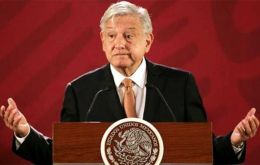
Mexican President Andrés Manuel López Obrador (AMLO) announced Thursday that he did not share his Brazilian colleague Luiz Inácio Lula da Silva's idea that Venezuela should hold fresh elections to get out of the current crisis.
-
Monday, April 29th 2024 - 21:38 UTC
ICJ: Now Ecuador files case against Mexico
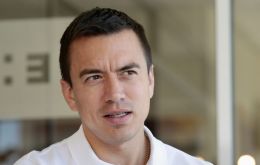
Ecuador's conservative government of President Danie Noboa Monday filed a case against Mexico before the International Cout of Justice (ICJ) in The Hague (The Netherlands) for granting asylum to a fugitive at the Embassy in Quito. Former Ecuadorean Vice President Jorge Glas, who had been sentenced to 8 years in jail for corruption, had sheltered at the mission until local authorities stormed it in disregard of all international conventions on diplomatic immunity and arrested him.
-
Monday, April 8th 2024 - 08:25 UTC
Mexico to bring Quito Embassy case before the ICJ
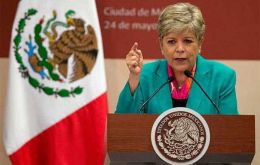
After successfully pulling out of Ecuador all 18 members of its diplomatic mission following the breakup after Quito's unlawful actions at the Mexican Embassy in Quito, the government of President Andrés Manuel López Obrador (AMLO) announced Sunday that a case would be filed before the International Court of Justice in The Hague (The Netherlands) first thing Monday.
-
Saturday, March 30th 2024 - 11:24 UTC
No diplomatic rift between Argentina and Mexico despite verbal clash between Milei and AMLO
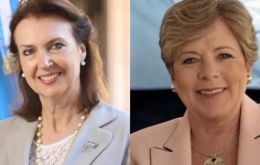
Foreign Ministries Diana Mondino of Argentina and Alicia Bárcena of Mexico held a telephone conversation Friday during which they concurred that the recent exchange of epithets between Presidents Javier Milei and Andrés Manuel López Obrador (AMLO) did not jeopardize the two countries' diplomatic relations, which they agreed to label as “solid.” Bárcena and Mondino thus made it clear that neither nation intended to escalate the dispute.
-
Wednesday, June 14th 2023 - 09:20 UTC
AMLO picks former ECLAC boss for FM post

Mexican President Andrés Manuel López Obrador (AMLO) Tuesday announced he had picked former Economic Commission for Latin America and the Caribbean (ECLAC) Executive Secretary Alicia Bárcena as the country's next foreign minister following the resignation of Marcelo Ebrard to devote himself to his electoral run.
-
Monday, September 5th 2022 - 18:07 UTC
ECLAC's new boss appointed

Costa Rican economist José Manuel Salazar-Xirinachs has been chosen to replace Mexican diplomat Alicia Bárcena at the helm of the ECLAC after 14 years on the job, it was announced. Salazar took the oath of office before UN Secretary-General Antonio Guterres.
-
Friday, December 10th 2021 - 09:34 UTC
Latin America's exports this year to increase 8% in volume and 17% in value, ECLAC report
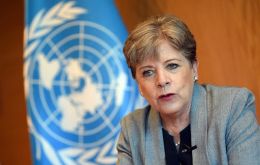
The United Nations Economic Commission for Latin America and the Caribbean estimates a 25% increase in the value of regional goods exports during 2021, following a 10% drop in 2020, driven by a 17% rise in export prices and an 8% expansion in the volume of shipments.
-
Monday, October 18th 2021 - 09:57 UTC
PAHO/ECLAC report on Covid-19 exposes the fragility of Latin America's health systems
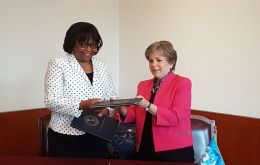
In n a new joint report released the Pan American Health Organization (PAHO) and the Economic Commission for Latin America and the Caribbean (ECLAC) urge the governments of the region to accelerate vaccination processes and improve health systems.
-
Wednesday, September 1st 2021 - 09:54 UTC
Latin America and Caribbean expected to grow 5.9% in 2021, ECLAC says
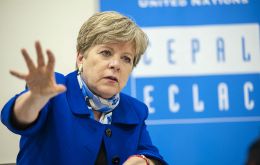
A new “Economic Study of Latin America and the Caribbean” report released Tuesday by the Economic Commission for Latin America and the Caribbean (ECLAC) raised its growth forecast for the region from 5.2% in July to 5.9%.
-
Friday, August 6th 2021 - 07:34 UTC
Latin America and Caribbean FDI in 2020 was the lowest since 2010, ECLAC annual report
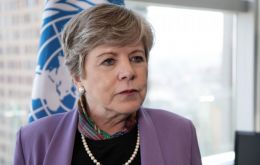
Latin America and the Caribbean received US$105.48 billion in Foreign Direct Investment, FDI, in 2020 – 34.7% less than in 2019, 51% less than the record high achieved in 2012, and the lowest since 2010, the Economic Commission for Latin America and the Caribbean (ECLAC) indicated during the presentation of the annual “Foreign Direct Investment in Latin America and the Caribbean, 2021”
